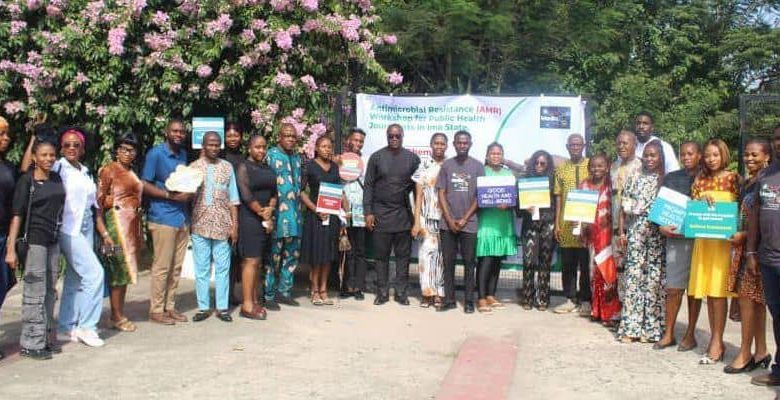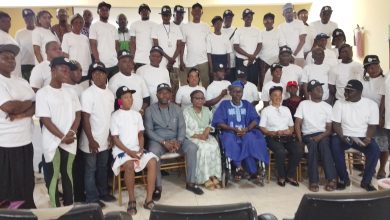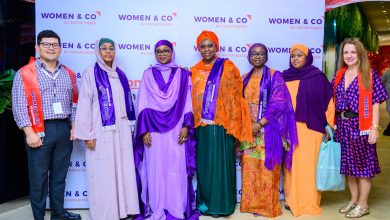Health experts task journalists on AMR reportage, enlightenment

Photo: Group photograph of the facilitators and participants at the Workshop on AMR held in Owerri, the Imo State capital recently.
By Athan Agbakwuru, Owerri
Health experts task journalists on AMR reportage, enlightenment
By Athan Agbakwuru, Owerri
Journalists and other media stakeholders have been enjoined to, as a matter of urgency and necessity, give priority attention to the medical challenge of Antimicrobial Resistance, AMR, in Nigeria, with the view to creating public awareness about it.
Abujah Racheal, AMR Ambassador and EIS fellow, in a paper presented during a Workshop to mark the 2024 World AMR Awareness Week with the theme, “Educate, Advocate, Act Now.” (Focusing on Antimicrobial Resistance awareness and advocacy) held in Owerri, the Imo State capital.
Abujah, a seasoned health journalists reminded the participants that media practitioners ‘hold the power to educate, influence, and amplify the voices of millions,’ on the prevalence of AMR in the country.
Describing AMR as a silent killer that requires urgent concern, she revealed that World Health Organization, WHO, records indicate that AMR causes the death of about 1.27million persons globally every year with over 4.95 million deaths linked to resistant infections.
Abujah who defined AMR as a condition of drugs relied upon for treatment of diseases losing their potency against the infections pointed out that WHO declared that AMR occurs when microorganisms like bacteria, viruses and fungi develop resistance to the drugs meant to kill them.
Her words, “Today, I come to you with a matter of profound urgency: Antimicrobial Resistance (AMR)—a silent yet deadly crisis threatening the health, livelihood, and future of Nigerians
“According to the World Health Organisation (WHO), AMR occurs when microorganisms like bacteria, viruses, and fungi evolve to resist the drugs designed to kill them.
“In simpler terms, the medicines we rely on to treat infections are losing their effectiveness.
Globally, AMR is responsible for 1.27 million deaths annually, with over 4.95 million deaths linked to resistant infections. In Nigeria, the burden is alarming.
“Drug-resistant malaria, tuberculosis, and bacterial infections are increasing, often leaving healthcare providers powerless. Picture a mother in a community whose child succumbs to a treatable infection because no antibiotics work.
“Or a young man in Imo State unable to recover from a resistant strain of tuberculosis. These are not abstract scenarios, they are real, and they are growing.
“AMR is a silent pandemic, and silence of the media allows it to thrive. Here is where our expertise comes in:
The resource person therefore tasked journalists in Imo to among other things embark on raising awareness, uncovering hidden stories of AMR in communities and holding leaders accountable with a view to ensuring that governments, healthcare regulators etc act to reverse the ugly trend.
Many Nigerians are unaware of the dangers of misusing antibiotics. Through our platforms, we can educate the public about the consequences of self-medication and overuse by uncovering stories holding leaders accountable through governments, healthcare providers, and regulators who must be made to do more to address AMR.
On how best to make AMR resonate with in society , she recommended human stories, data-driven features by deriving into statistics from health authorities, such as the Nigeria Centre for Disease Control, NCDC, to show the impact of AMR on healthcare systems.
According to her, tackling AMR will not be easy as It requires a multisectoral approach involving healthcare, agriculture, education, and media. But our work as journalists can pave the way via collaboration with experts, leveraging your platforms, advocacy for change and push for better policies.
“Ladies and gentlemen, colleagues, AMR is a race against time. If we fail to act now, the consequences will be catastrophic, not just for healthcare, but for our economy and national development.
“As journalists, we have the power to amplify this issue, make it relatable to everyday Nigerians, and push for solutions that save lives.
“I urge us to use our voices to turn the tide against AMR. Tell the stories that need to be told. Hold leaders accountable, and most importantly, help Nigerians understand that this fight belongs to all of us,” she added.
Other speakers, Chukwuemeka Paschal, Dr Rilwan Yahaya and Dr Olayinka also harped on the role of journalists in publicizing AMR prevalence with a view to finding lasting solution to the menace.
“AMR threatens the very foundations of modern medicine, compromising our ability to treat even the simplest infections. Its implications are far-reaching: food security, economic stability, and the well-being of humans, animals, and our environment,” Chukwuemeka submitted.





